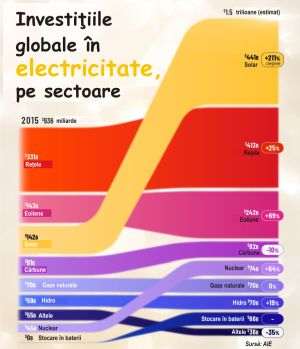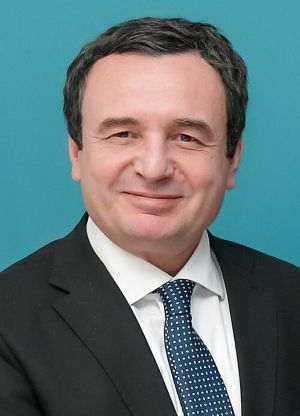Reporter: What is the current stage of the IPO of Electrica?
Gabriel Dumitraşcu: The IPOs conducted in 2013 have given the Romanian equity market a boost and they have demonstrated the interest of institutional investors in Romanian energy companies, confirming the potential which they have in the European and global energy sector.
Following the international impact ensured by these public offers conducted in 2013, Romania is preparing the final details for the passage of the Bucharest Stock Exchange from the frontier market to the emerging market category.
We stand by our strategic ambition to preserve and develop the investors' confidence in the companies in the energy sector and in Romania's energy resources, responding to the current challenges and focusing on improving the efficiency of the activity of economic operators in this sector.
The acceleration of the structural reforms and the mobilization of the great internal efficiency reserves of the companies in the energy and energy resources sectors will help our economy tap its growth potential and will allow increasing the competitiveness of the industry.
The process of selling 51% of the government's stake in Electrica SA has been reviewed at length and scheduled as a strategic listing. We have acted on several levels towards restructuring the Electrica SA group, in order to increase its attractiveness to investors. I can say that, in the context of a difficult year, full of turmoil, we have succeeded in keeping the IPO within the deadlines agreed with the IMF. This means that at the end of May we are going to make the announcement and in the first half of June we will conduct the listing.
The Trade Registry has recently approved a de-merger of Electrica SA, from which will be spun-off a company for the management of minority interests which Electrica holds in its privatized subsidiaries. I hope that this will not take more than 2-3 weeks. Through this operation, we have increased the attractiveness of Electrica SA, because any investor wants to place their money in a company with predictable business, and the core activity of Electrica SA does not include the management of minority stakes.
Reporter: According to the draft government decision concerning the IPO of Electrica, you were expecting a bid of 800-1 billion Euros in the IPO. Does this mean that 4-500 million Euros will actually enter the company through the listing?
Gabriel Dumitraşcu: In the draft law there is no mention that this is the bid we are expecting. The period wherein we are in touch with investors isn't over yet. What awe are saying is that, in order to have an optimal allocation in the IPO and a future shareholder structure that would maximize the odds of a positive evolution of the stock of Electrica on the secondary market, the IPO would have to be oversubscribed at least twice. That is why I have mentioned this range of 800 million Euros - 1 billion Euros. If the IPO of Electrica were oversubscribed twice, then we would have the option to do a qualitative allocation. We have the model of the listing of Romgaz, where the massive oversubscription has allowed us to do a qualitative allocation, which has offered the company a stability in the secondary market and even a good evolution of the stock price. We want the same thing in the case of Electrica, which is why we have proposed a classic European dual-listing model.
I am a supporter of standard procedures. We shouldn't attempt to meddle with a solution that has yielded results elsewhere. We can't make up privatization methods that no one understands, like we've done so far. Big investors are use to specific models and if we do not have pragmatic privatization models, then they are reluctant to get involved. At most, we can model the area of competition in the bidding period.
We also acknowledged the mistake we have made in the listing of Romgaz, which has led to the swelling of the bid on the retail tier, in the last days. For Electrica, we have proposed the split of the retail tier in two segments, one for small investors and one for big investors. Through what we are proposing, we are eliminating the mistake we have accepted responsibility for in the case of the Romgaz IPO.
Reporter: Will there be more stock allocated to small investors in the Electrica IPO? In the case of Romgaz the interest from them seemed quite significant.
Gabriel Dumitraşcu: When we are speaking about the appetite for shares in Romgaz on the retail tier, I'd rather we didn't speak about appearances. In the case of the IPO of Romgaz, there was no extraordinary appetite on the retail segment, but rather there certain investors have resorted to financial instruments intended to distort the retail tier. If we look at the number of unique investors registered with the Central Depository, we will see that their number has seen an increase, but nothing spectacular. I am still trying to be cautious and I estimate that after the IPO of Electrica the number of small investors on the Bucharest Stock Exchange will increase by 1,000, or a maximum of 2,000. Electrica is an energy group of long-lasting tradition and a large number of employees who will definitely subscribe.
Reporter: Did the unions of Electrica initiate talks with the Department for Energy, to have a number of shares set aside for them, as has happened in the case of Nuclearelectrica?
Gabriel Dumitraşcu: We can't implement a discriminatory treatment. The employees of Electrica will bid on the tier reserved for small investors, just like every other individual.
Reporter: What will happen to the shares reserved to the employees in the privatized subsidiaries of Electrica?
Gabriel Dumitraşcu: The sale of those shares to the employees is the object of an emergency ordinance, which has seen the deadline for its application extended until the end of the year. The implementation of the ordinance has been delayed several times, and the norms for its application are in the process of being approved. The application directives were approved by the Ministry of the Economy, now they are in the process of being approved by the Ministry of Finance, and they also have to receive the greenlight from the Ministry of Justice to go up for approval at the Government. In my opinion, we can't afford another extension of the deadline and it's about time we completed the sale of the shares to the employees of Electrica that are interested.
Reporter: But are they still interested after all these years? Do they still have the money to buy all these shares?
Gabriel Dumitraşcu: Every employee will run their numbers and will choose: they will either buy shares in the privatized subsidiaries or they will have the option to use their savings by subscribing in the Electrica IPO of June. The shares in the privatized subsidiaries will be sold at the price paid by the strategic investors. The employees have the choice between being captive shareholders in these privatized companies and placing their savings in the Electrica IPO, at a price set by the market, with a much better liquidity, meaning that they can convert those shares to cash at any time. In most cases, the privatizations of the subsidiaries of Electrica have been done, in general, at good, high prices. The employees will probably review the dividend policy of the privatized subsidiaries, which isn't in every cases very incentivizing to the shareholders. If the employees of Electrica don't buy the shares of the subsidiaries, then the strategic investors will have the right to acquire them.
Reporter: Do you think that the majority of employees will prefer to subscribe in the Electrica IPO?
Gabriel Dumitraşcu: Where the price of the shares in the privatized divisions is good, the employees will buy those shares. Where the price was high and the dividend policy has been restrictive, I think the employees will opt for the Electrica IPO.
Reporter: Where will you hold the road-show-for Electrica?
Gabriel Dumitraşcu: We have an elaborate plan for promoting the company during this period. Meetings with the analysts have already taken place. We are going to meet with investors from all areas of interest of the world. We will also go to London. We are targeting those investors that have the right profile for Electrica. Specifically, major investment funds that place their resources in utility companies.
In the case of Electrica, we have aimed to define the scope of the IPO correctly. Aside from the split of the company, we have been forced to liquidate three of the electricity services companies of the group. Another energy services company will enter insolvency. We have taken these steps precisely to assure investors that Electrica will not own companies that have no future. Thus, only one restructured energy services company (ed. note: Electrica Serv) will remain in the group. Over the last few months, we have succeeded in reducing the arrears of Electrica Serv by 60%, from 109 million lei on December 31st 2013, to approximately 50 million lei. The plan we have implemented allows us to say that the arrears of this company will fall to zero towards the end of this year.
Furthermore, in the case of Electrica Furnizare we have dealt with the issue of the historic debts of the Romanian Railways (CFR). About two weeks ago, we have reached an agreement with CFR, which will pay to Electrica Furnizare the principal, and the penalties will be adjusted to a level similar to a loan equal to the principal. Absent this agreement, we would have been forced to set up provisions for the whole amount of the debt in the budget of Electrica Furnizare, which would have affected the attractiveness of the Electrica group IPO.
Reporter: The tensions between Ukraine and Russia have also affected the European stock markets, including ours. Have you considered this aspect when thinking of the listings of energy companies scheduled for this year?
Gabriel Dumitraşcu: Sure, this period is not as favorable for IPOs as last year was. But the tensions in the vicinity of Romania can be used as opportunities. It is obvious that there have been and there will continue to be outflows of capital from the markets in the region, but I think that we have the ability to attract this capital towards our listings. I have talked to the colleagues of Electrica about such a plan because we want to take over the capital that is exiting from the regions in the proximity of Romania.
Our insistence to have the company listed on the London market should be viewed from the same angle and as having the same goal. Many people have become by default opponents of the Global Depository Receipts. But the Bucharest Stock Exchange is a relatively small market. On such a market, speculative tendencies get maximized. I doubt that the BSE has the ability to counteract heavy speculative actions. In order to prevent the instability of the major Romanian companies listed on the Bucharest Stock Exchange, we have proposed this dual listing system. We are offsetting Bucharest with London, which is a mature market, where speculative attacks are hard to complete. London is a counterweight that balances the Bucharest stock market in the event of major speculations.
If we look at the evolution of Romgaz, then we will find that even though in Bucharest there have been attempts to speculate on the shares, the counterweight of London has offset these actions. I think that from that point of view, it is also a good idea to take Electrica, but in keeping things in convenient proportions, so that we can contribute to the development of the domestic stock market.
Furthermore, through dual listings we want to bring to Bucharest the major investment funds. Until major investors gain confidence in our Romanian stock market, it is natural to attract them through the GDRs, which give them the comfort of the practices of the London Stock Exchange. From that point of view, investors place their funds in certificates, but they are also starting to focus on the Romanian market. Absent this intermediate instrument, I doubt that the BSE would have the ability to attract the major investors.
Reporter: Will the debt that Oltchim owes Electrica stay with the company that gets listed, or will it be taken over by the company that manages the minority stakes?
Gabriel Dumitraşcu: All the receivables of Electrica will remain with the company that gets listed.
Reporter: What are the chances of Electrica recouping at least some of the money that it is owed by Oltchim? The receivers of Oltchim have asked the creditors to review a new postponement of the privatization.
Gabriel Dumitraşcu: Based on the latest talks, there is a new, more pragmatic perspective of selling and resuming the operation of the plant. We need to give Oltchim the chance of privatization and increasing efficiency. Any other solution is a losing one and it doesn't maximize our chances of recouping part of that debt.
Reporter: The Proprietatea Fund criticized the management of Electrica. More to the point, what is the problem and how would you comment?
Gabriel Dumitraşcu: The Fund has a problem with the corporate governance principles. The Proprietatea Fund owns shares in the divisions of Electrica, not in Electrica SA. The Funds holds 22% of each of those divisions. I am sure that there are discrepancies between the vision of the state, which is the majority shareholder, and that of the Proprietatea Fund, which has among its shareholders an investment fund which is internationally acknowledged for its aggressiveness and appetite for risk and speculation. Electrica can not shirk the responsibility that it gets from the majority stakes in the group. The whole group must think and act as cohesively as possible. Electrica SA must create an impression of consistency in the development of the subsidiaries. Apparently, the Proprietatea Fund says it is violating the corporate governance principles. But the simple fact that we are trying to manage the group just like the strategic investors who bought the subsidiaries of Electrica and which are integrated holdings, allow me to say that the Proprietatea Fund is not right. From the perspective of the Electrica IPO, in a few months we will have a predominantly private and very diverse shareholder structure at Electrica. These new shareholders will have the option to validate the strategy and the corporate policy of the group or not. I doubt that they will agree to deliberately cede the management in favor of the subsidiaries and of the Proprietatea Fund.
Reporter: Do you think the Proprietatea Fund will participate in the listing of Electrica?
Gabriel Dumitraşcu: It is not the time to make a statement in that regard. I have seen no interest from them in that regard. They are only are only explorations from their parts. I hope that the Proprietatea Fund will show interest in the IPO of Electrica. It would be a validation of its seriousness in the current context of the economy and of the Romanian stock market.
Reporter: There are opinions on the energy market that it is a problem to take Electrica SA, that it is just an "umbrella" for the companies in the group that are in charge of the distribution and supply of the energy. Some of the people say that it would have been more profitable for the authorities to sell the subsidiaries to strategic investors. How would you comment?
Gabriel Dumitraşcu: From the point of view of the state's interest, it is far more efficient to privatize the parent company on the stock market. We have done strategic privatizations of some distribution subsidiaries. Everyone was expecting an improvement of the situation from the point of view of the end customer. I am referring here to the quality of the services. If we look at the charts of the energy regulators, we can see that state-owned Electrica remains at the top. If we look at the dividends paid out by the privatized subsidiaries we will see that they did not pay much dividend to talk about. And then why did we do that kind of privatizations?
The privatization on the stock market of an integrated group is auspicious, because Electrica SA has reached maturity. Right now, on the European energy market, there is a tendency of reconsolidation and integration because it has been found that it is still the heavy players that offer stability, predictability and certainty in the supply of energy. We are privatizing Electrica at an auspicious moment of its development, and the state keeps an important minority stake.
Reporter: The BSE is not great when it comes to liquidity. From that point of view do you have any worries for the listings which are scheduled to take place this year?
Gabriel Dumitraşcu: Each company has a history and to the extent that its story is credible and backed by facts, then it sparks the investors' interest. The interest in buying is being a bit watered down by the timing of the listing and by the market conditions. I have a more cautious optimism when it comes to the success of this year's listings, but it is there.
Reporter: Will the company spun off from Electrica be eventually turned into an investment fund?
Gabriel Dumitraşcu: It is something which we should consider for this company. The state budget can not finance the major investments in energy that are needed. It would be a shame for the government not to create an investment vehicle for energy projects. A fund for investments in energy is absolutely necessary for supporting investments in energy. We have discussed and will continue the dialog with the Ministry of Finance on that subject.
Reporter: The Oltenia Complex is facing issues specific to the energy market, where there is an overabundance of cheap green energy and shrinking demand. When do you think a listing of this company will be possible?
Gabriel Dumitraşcu: Unfortunately, we have not found an international consultant to appraise the coal resources of the Complex. With great difficulty we have succeeded in selecting a Romanian consultant, which is part of a consortium with an American company. The time frame they have requested for the assessment is two months and a half. Thus, we are unable to make the IPO in June, like we had initially planned last year. We have rescheduled it for until September 15th, 2014, because the stock markets are not auspicious for such an action in the July-August period. Most likely, the IPO will take place in October this year.
The Oltenia Complex is undergoing a process of structural adjustments. The shame is that when it was created, three years ago, nobody thought of doing a simple calculation and realize that the output of coal exceeded the volume that was necessary for the electricity output of the complex. Because of that, the company had to produce and sell coal to third parties as well, specifically thermo-electric power plants managed by local councils. These thermoelectric power plants owe the Oltenia complex over 800 million lei. In spite of this fact, the company is still generating profit. Therefore, it has a huge profitability potential.
The Oltenia complex has underwent a restructuring process, and that process will continue. Whereas two years ago it had the electricity priced at over 200 lei/MWh, the price has now dropped below 170 lei/MWh. But these adjustments are now reaching their limit and from now on we have to enter a market context that is fair to all producers.
There are many things for the regulator to get straight in the market rules. If everybody keeps saying that the green energy producers have the lowest prices, then why aren't we seeing this cheap energy in the consumer basket of the population? All the consumers pay for green certificates and they subsidize the green energy and that is why I would find it fair for them to benefit from it.
A few years ago, we were discussing a price of 2.3 million Euros per installed MW in renewable energy. We are now talking about 0.8-1.5 million Euros. From our point of view, of the energy producers, I think that the green energy industry has reached maturity and it no longer needs any aid scheme. The installed MW in renewable energy forms is cheaper than the MW produced using the classic methods.
Reporter: The Oltenia Complex recently announced that it wants to outsource two mines. What is the current state of that process?
Gabriel Dumitraşcu: We have tried to perform a spin-off and to take the Berbeşti and Husnicioara mines from the Oltenia complex. The first one needs to be transferred to the CET Govora Thermoelectric Plant and the second - to the Government Business Enterprise for Nuclear Activities. These mines are dependent on the two energy producers. But the Proprietatea Fund has a different vision and has challenged our proposal. The Fund wanted an asymmetric spin-off. In other words, the state would be the owner of the mines that we want to outsource, and the Proprietatea Fund would increase its stake in the Oltenia Complex. We told them that their approach was not fair and we are still negotiating with the representatives of the Fund on that matter. If we fail to reach an agreement, we will try to pass some legislation that would place the Berbeşti mine under the control of CET Govora. That alone would cause the price of the Oltenia Complex to fall by 4 lei per MWh.
Reporter: Hidroelectrica is insolvent once again. What will happen to the contract for the intermediation of its listing?
Gabriel Dumitraşcu: We have agreed with the intermediaries to suspend that agreement. Hidroelectrica won't pay anything during the time that the contract is suspended. Meanwhile, the company will continue its reorganization. Professional managers will be appointed and the sale of the microhydroelectric plants will continue. These microhydroelectric plants provide 2-5% of the total output of Hidroelectrica, but they consume over 18% of the resources. The interest of Hidroelectrica is to focus on its core business, namely the output of the major hydroelectric plants.
Also, together with receiver Remus Borza, we have selected a number of assets that are not part of the core business. They include hotels, holiday homes, plots of land and buildings under conservation or athletic bases. All of these assets are in the process of being appraised and having their legal status clarified, and we are hoping to put them up for sale in the second half of 2014.
We hope to raise about 130 million Euros from the sale of these microhydroelectric plants and these assets, which we want to use to retool the big hydroelectric plants. This will allow us to increase output by 10-12% without Hidroelectrica resorting to bank loans.
Reporter: Thank you!























































